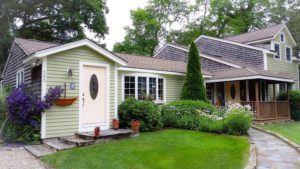
As the registration and first payment deadline for the new Mass. short-term rental tax approaches, some home owners are confused and frustrated by unanswered questions about how the tax is collected and exactly who owes it. Airbnb has acknowledged that it has collected the new tax from customers of at least some hosts who are legally exempt from paying it.
Home owners and their agents who rent rooms or entire homes for more than 14 days a year but not more than 31 consecutive days at a time face an Aug. 20 deadline to register with the state Dept. of Revenue (DOR). They will also owe their first payments to the state for July taxes on that date.
The new law, signed in December 2018 and effective July 1, extended the state’s 5.7-percent room excise tax, which previously affected hotels and similar lodgings, to short-term rentals. On Cape Cod and the Islands, another 2.75-percent tax goes to a new water protection fund. And under a local option, the law allows towns to add an excise of up to 6 percent more.
Eastham, Wellfleet, and Truro set their local option excise at 4 percent, while Provincetown’s is 6 percent. So the total tax comes to 14.45 percent in Provincetown and 12.45 percent in the other three towns.
The small B&B home exemption
Nancy Scaglione-Peck and her husband, Bob Peck, both retired schoolteachers, have been renting two rooms in their Eastham home and serving breakfast to guests for over 12 years. Like many Outer Cape residents, they depend on this additional income. They find most of their renters online through Airbnb.
Scaglione-Peck said she had researched the new tax law early this year and understood that she was exempt from it as a “bed-and-breakfast home.” But she was surprised, she said, by emails from Airbnb suggesting that she lower her prices in anticipation of the new tax.
In July Scaglione-Peck realized that Airbnb was collecting the excise tax from her renters in spite of the exemption. When she told Airbnb customer support that her type of lodging was exempt, she said, she was told there was no mechanism for making that happen — she could waive her exemption or not accept reservations.
Naysa Woomer, a communications specialist at the DOR, confirmed that a private owner-occupied house where no more than three rooms are rented, breakfast is included in the rent, and all accommodations are reserved in advance, is exempt from the room occupancy tax as a bed-and-breakfast home. Home owners running short-term rentals in this way are also not required to register with the DOR. [Editor’s note: The reporter of this story operates a bed-and-breakfast home in Wellfleet.]
Liz DeBold Fusco, a spokesman for Airbnb, told the Independent that “we are still in the process of developing guidance with DOR around everything.” She acknowledged that the company had collected some taxes in error but would not comment on whether or how the money would be refunded.
DeBold Fusco said that going forward Airbnb would follow up with hosts in the bed-and-breakfast home category to ensure that they are exempt from the tax. “Customer service is informed and knows the appropriate procedure to follow,” she said.
Home owners and rental agents who do owe the tax can register online at the DOR’s MassTaxConnect site (mtc.dor.state.ma.us/mtc), which is difficult to navigate without instructions. Helpful guidance can be found at https://www.mass.gov/info-details/room-occupancy-frequently-asked-questions#registration-faqs.
Online rental agencies like Airbnb, HomeAway, and VRBO have entered agreements with the DOR to collect the tax on behalf of their clients. “Airbnb is basically taking care of the tax,” said Sarah Burrill, who rents four rooms in her home in Eastham. “I don’t have a problem with any of it.”



